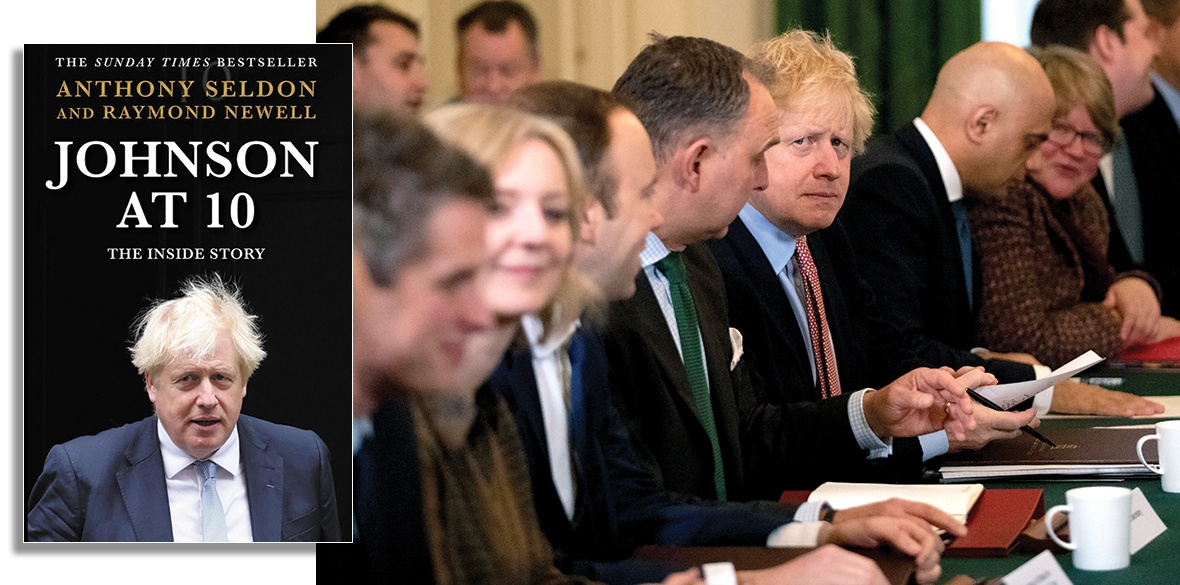This is the last article you can read this month
You can read more article this month
You can read more articles this month
Sorry your limit is up for this month
Reset on:
Please help support the Morning Star by subscribing here
Johnson at 10: The Inside Story
by Anthony Seldon and Raymond Newell
Atlantic Books, £25
THIS is a terrific book, a real page-turner, and a fascinating account of an administration that was both very significant and hugely disappointing.
In 2019, the Labour Party played into Johnson’s hands. “It was supreme irony that the pro-EU opposition finally granted Johnson his wish for a general election,” say the authors.
The Labour Party foolishly underestimated its nemesis.
“We were surprised: even John McDonnell, who we rated, continued to regard Boris as a buffoon, rather than as a serious threat,” said Conservative Campaign Headquarters electioneer David Canzini.
However unpopular Johnson was, Labour’s leader proved even more unpopular: the Labour vote fell by 2.6 million from 2017.
In the 2019 election, the Brexit Party cost the Conservatives an estimated 25 MPs.
“Unsurprisingly, relations with [Nigel] Farage during the campaign, and still more after, were icy.”
Notions of a Johnson/Farage alliance are dismissed as fantasy.
A triumphant Johnson announced in July 2019 that he would focus on social care and that he had a “plan.” But, as it turned out, he had no focus and no plan for social care, nor indeed on any other matter.
Andrew Dilnot’s 2011 report on Funding of Care and Support is still the most practical, cheapest and detailed scheme.
This would introduce a cap of £86,000 on the lifetime costs of social care, with the government also covering costs for those with assets of less than £20,000, and means-tested support for those with assets of between £20,000 and £100,000.
The total cost would be roughly £5-£8 billion. But Johnson’s chancellor Rishi Sunak characteristically shot it down, and Johnson was too weak and disorganised to push it through.
The Johnson government did not cope with Covid at all well. Britain came 15th out of 28 EU member states in terms of excess mortality.
We had roughly 315 excess deaths per 100,000 people, higher than France (220), on par with Germany (290) and Spain (340), and lower than Italy (470).
We performed the worst of the G7 economically: when Johnson left office on September 6 2022, we were the only G7 country not to have yet recovered to pre-Covid levels.
The authors judge that “the failure to lock down until November [2020] was a preventable, predictable and irresponsible mistake. The failure to extend the lockdown once highly effective vaccines had been found was even more egregious.
“The majority of deaths in the UK occurred during the second wave, including the very peak. The data was available, the advice to No 10 clear. It was a political error and weakness not to follow it.”
Britain produced a vaccine which saved 6.2 million lives globally over its first year. But, after the 2021 G7 meeting: “Regrettably, the UK the failed to follow through to ensure G7 countries deployed Covid vaccines in the most vulnerable countries anywhere near equivalent to the need.”
The authors judge that “much of the success of the G7 and Cop26 was down to listening to the White House and securing its backing.” (That is, doing whatever the US wanted, as usual.)
The “success” seems to be that the G7’s final communique “was significant, shaped by the US, for calling out China for the first time in the G7’s history.”
But that “success” really didn’t outweigh the G7’s colossal failure — its callous abandonment to Covid of the poorest peoples in the world.
When Johnson left office, the 2019 manifesto’s promise of 6,000 more GPs had been broken, and there were still shortfalls of 50,000 nurses and 12,000 hospital doctors.
The government refused to commit itself to regularly publishing either the figures on workforce shortages, or any plans to address these shortages.
Johnson, like the Conservative Party (and the rest of Parliament), was torn between two versions of capitalism. But “the two contradictory visions of a free-trading, low-tax, deregulated economy versus a protectionist, levelling-up, pro-environmental agenda would always be irreconcilable.”
The Johnson government veered more towards the latter than any government for over 40 years, but most Conservative MPs still embraced the destructive doctrine of Thatcherite austerity.
At the same time, “most of his parliamentary party wanted the mission to be galvanizing the country and economy to demonstrate the benefits of Brexit, for immigration to be controlled and public services to be improved.”
But their love of Thatcherism, with its prioritisation of finance over the real economy, its dogmas of free movement of labour (as of capital), and its small-state mania, blocked this programme.
As a result, “levelling up was barely acted upon and Britain is more regionally unequal now than it had been when he assumed power in July 2019.”
Rebuilding the economy, controlling immigration and improving public services would have been, and remains, a popular programme, but finance capital blocks the way.
And ironically, it was Johnson’s free-trading, low-tax, deregulated economy ideology that stopped him achieving his protectionist, levelling-up, pro-environmental agenda.









